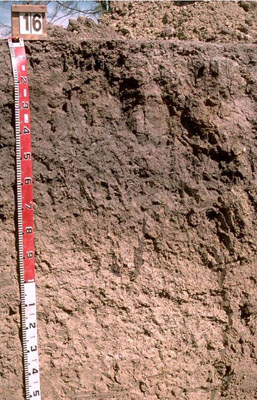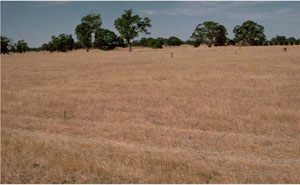LSWW16
|
| LSWW16 |  Endocalcareous-Endohypersodic, Self-mulching, Grey VERTOSOL | |
|
Location | North of Benayeo, western Victoria | |||
|
Landform | Plain | |||
|
Geology | Quaternary swamp and lake deposits: paludal silt and clay | |||
|
Element | Plain | |||
Horizon | Depth (cm) | Description | ||
A1 | 0–10 | Dark greyish brown (10YR4/2); light clay; moderate coarse polyhedral structure; self-mulching surface condition (particularly evident after cultivation); strong consistence when dry; pH 8.6: | ||
B21 | 10–20 | Grey (10YR5/1) with slight brownish yellow (10YR6/8) mottles; medium clay; moderate coarse prismatic, parting to moderate coarse blocky structure; smooth ped fabric; strong consistence when dry (complete dispersion when worked); pH 8.4: Note: Within the upper subsoil there is a discontinuous bleached A2 horizon with a fine sandy clay loam texture. | ||
B22 | 20–40 | Medium clay; lenticular structure and some slickensides; smooth ped fabric; pH 8.7: | ||
B23 | 40–60 | Medium clay; lenticular structure and some slickensides; smooth ped fabric; complete dispersion; pH 8.8: | ||
B24 | 60–80 | Medium clay; smooth ped fabric; pH 9.0 ; | ||
B25 | 80–130 | Medium heavy clay; strong fine lenticular, parting to very fine lenticular structure; smooth ped-fabric; pH 9.3: | ||
B26 | 130–180+ | Heavy clay; some slickensides; smooth ped fabric; few soft and hard calcareous and silica nodules; pH 9.1. | ||
| Management Considerations | ||||
| ||||
Horizon | Depth (cm) | pH (water) | pH (CaCl2) | EC dS/m | NaCl % | Exchangeable Cations cmol-/kg | Wilting Point (pF4.2) | Coarse Sand % | Fine Sand % | Silt % | Clay % | |||
Ca | Mg | K | Na | |||||||||||
A1 | 0–10 | 8.6 | 7.9 | 0.14 | 22 | 5.6 | 1.5 | 0.8 | 20.3 | 7.4 | 28.6 | 7 | 48 | |
B21 | 10–20 | 8.7 | 7.8 | 0.2 | 25.9 | 6.1 | 20.4 | 5 | 58 | |||||
B21 | 10–20 | 8.4 | 7.1 | 0.06 | 6.8 | 2.8 | 0.4 | 0.9 | 8.5 | 14.4 | 47.4 | 12 | 21.5 | |
B22 | 20–40 | 8.7 | 7.5 | 0.25 | 15 | 13 | 1.6 | 6.4 | 4.6 | 15.7 | 8 | 62.5 | ||
B23 | 40–60 | 8.8 | 8 | 0.32 | <0.05 | 13 | 14 | 1.6 | 8.4 | |||||
B24 | 60–80 | 9 | 8.2 | 0.27 | ||||||||||
B25 | 80–130 | 9.3 | 8.5 | 0.74 | 0.07 | 9.2 | 14 | 1.3 | 12 | |||||
B26 | 130–180+ | 9.1 | 8.6 | 1.1 | 0.16 | |||||||||



